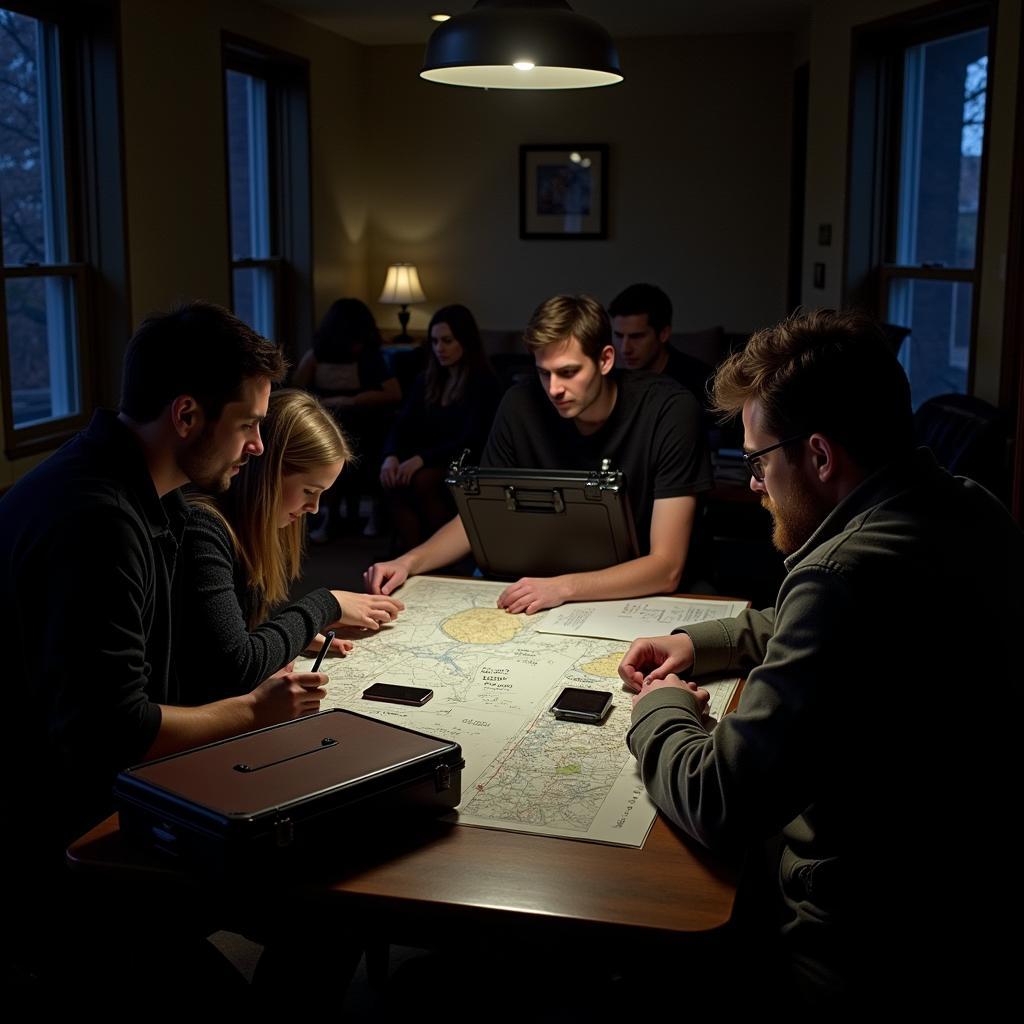Research objectives are the compass guiding any investigation, whether it’s exploring the origins of the universe or the mysteries of the paranormal. In the world of specters, unexplained phenomena, and ancient lore, having a clear research objective is paramount. It provides a framework, ensuring every spooky step leads us closer to understanding the unknown.
Why are Research Objectives Crucial in Paranormal Investigations?
 Paranormal Investigation Team Planning
Paranormal Investigation Team Planning
Imagine this: you’re part of a team investigating a supposedly haunted mansion. Without a defined objective, you’re like ghost hunters wandering aimlessly in the dark. Are you trying to prove or disprove the haunting? Are you focusing on a specific entity or event? A clear research objective provides direction, ensuring your efforts are focused and productive.
Constructing a Spooktacular Research Objective: A Step-by-Step Guide
Creating a robust research objective for your paranormal investigation doesn’t require summoning ancient spirits, but it does involve some thoughtful consideration. Here’s a guide to help you:
- Identify the Enigma: What’s the specific paranormal phenomenon you’re interested in? Is it a haunted object, a spectral presence, or an unexplained event?
- Formulate Your Question: Frame your objective as a clear, concise question. For example, “What evidence can be gathered to support or refute claims of a ghostly presence in the old library?”
- Define Your Scope: Determine the boundaries of your investigation. Will you focus on eyewitness accounts, electronic voice phenomena (EVP), or environmental anomalies?
- Methodology Matters: Outline the methods you’ll use to gather data. This could include interviews, historical research, or the use of specialized equipment like EMF meters and infrared cameras.
- Measurable Outcomes: Establish how you’ll analyze the data collected and what constitutes significant findings. Will it be a specific number of EVP recordings or a consistent pattern of temperature fluctuations?
Research Objectives Examples: Delving Deeper into the Paranormal
Let’s explore some specific examples of research objectives within the realm of paranormal research:
Objective: To determine if there is a correlation between reported cold spots and fluctuations in electromagnetic fields in a specific location.
- Methods: Measure EMF readings and temperature at various points within the location, focusing on areas with reported cold spots.
- Analysis: Compare and contrast EMF readings and temperature data to identify any potential correlations.
Objective: To collect and analyze eyewitness accounts of a purportedly haunted doll to identify common themes and patterns in the experiences.
- Methods: Conduct structured interviews with individuals who have had encounters with the doll.
- Analysis: Categorize and analyze interview data to identify recurring themes, emotional responses, and physical manifestations associated with the doll.
Ethical Considerations: Respecting the Spectral Realm
 Paranormal Researcher Analyzing Audio Recordings
Paranormal Researcher Analyzing Audio Recordings
While the pursuit of paranormal knowledge is thrilling, it’s essential to approach investigations with respect and ethical awareness. Always seek permission before conducting research on private property, handle potentially haunted objects with care, and never provoke or antagonize entities you encounter.
Conclusion: Illuminating the Paranormal Landscape with Clear Objectives
In the world of paranormal research, having well-defined research objectives is not just a matter of academic rigor, it’s a matter of navigating the unknown responsibly and effectively. By crafting clear, focused objectives, you can transform your investigations from spooky strolls into meaningful explorations of the unexplained. Remember, the answers we seek lie not just in the shadows, but in the thoughtful approach we take to uncovering them.
FAQs: Unveiling the Mysteries of Research Objectives
1. Can my research objective evolve during an investigation?
Absolutely! As you gather data, you may discover new avenues to explore, leading to adjustments in your objective. Flexibility is key, but ensure any changes are justified by your findings.
2. Do I need a scientific background to create a valid research objective?
While a scientific background can be helpful, it’s not mandatory. A curious mind, a methodical approach, and a commitment to ethical research are equally valuable.
3. What if my investigation doesn’t yield conclusive results?
Not every investigation will produce earth-shattering revelations. Sometimes, the most valuable findings are those that challenge our assumptions or lead us to ask even deeper questions.
Need further assistance with your Paranormal Research objectives? Contact us! We’re here to help you navigate the mysteries of the unknown.
Phone: 0904826292
Email: research@gmail.com
Address: No. 31, Alley 142/7, P. Phú Viên, Bồ Đề, Long Biên, Hà Nội, Việt Nam.